Entrepreneurship Report: UK Economy and Business Ventures Analysis
VerifiedAdded on 2019/12/18
|16
|5527
|150
Report
AI Summary
This report provides a comprehensive overview of entrepreneurship, focusing on the UK context. It begins by defining various types of entrepreneurial ventures, including small businesses, scalable start-ups, and large company entrepreneurship, and analyzes their characteristics and relationships. The report then assesses the impact of micro and small businesses on the UK economy using relevant data and statistics, highlighting their contributions to employment, economic growth, and adaptability. It further explains the importance of small ventures and start-ups in growing the social economy, particularly in the context of the UK's post-Brexit economic landscape. The report also delves into the skills, traits, and characteristics of successful entrepreneurs, and assesses different aspects of entrepreneurial personality contributing to motivation and positive mindset. Finally, it addresses how background and experience can act as barriers to adopting entrepreneurship. The report concludes by summarizing the key findings and emphasizing the significant role of SMEs in the UK's economic development.

Entrepreneurship
Paraphrase This Document
Need a fresh take? Get an instant paraphrase of this document with our AI Paraphraser
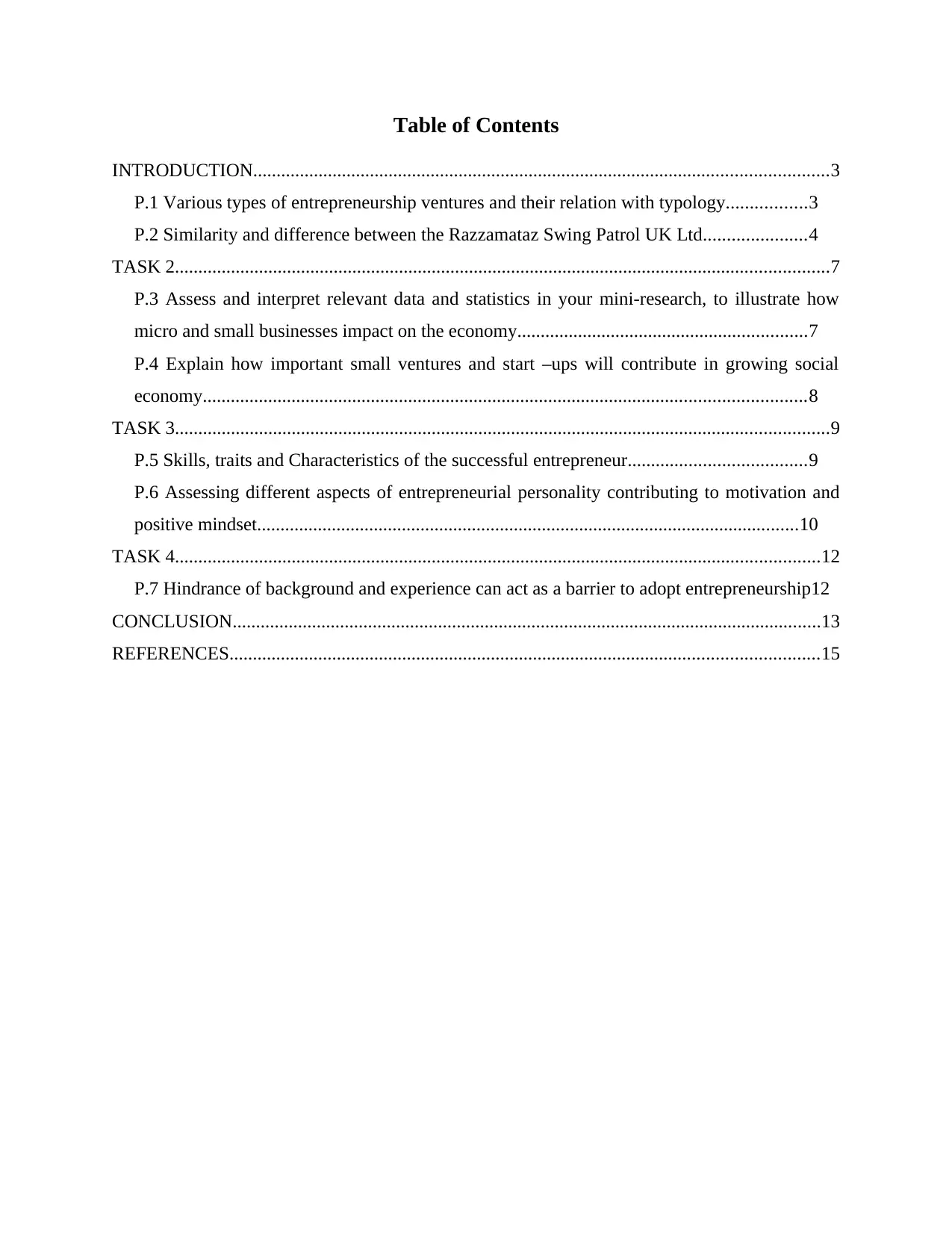
Table of Contents
INTRODUCTION...........................................................................................................................3
P.1 Various types of entrepreneurship ventures and their relation with typology.................3
P.2 Similarity and difference between the Razzamataz Swing Patrol UK Ltd......................4
TASK 2............................................................................................................................................7
P.3 Assess and interpret relevant data and statistics in your mini-research, to illustrate how
micro and small businesses impact on the economy..............................................................7
P.4 Explain how important small ventures and start –ups will contribute in growing social
economy.................................................................................................................................8
TASK 3............................................................................................................................................9
P.5 Skills, traits and Characteristics of the successful entrepreneur......................................9
P.6 Assessing different aspects of entrepreneurial personality contributing to motivation and
positive mindset....................................................................................................................10
TASK 4..........................................................................................................................................12
P.7 Hindrance of background and experience can act as a barrier to adopt entrepreneurship12
CONCLUSION..............................................................................................................................13
REFERENCES..............................................................................................................................15
INTRODUCTION...........................................................................................................................3
P.1 Various types of entrepreneurship ventures and their relation with typology.................3
P.2 Similarity and difference between the Razzamataz Swing Patrol UK Ltd......................4
TASK 2............................................................................................................................................7
P.3 Assess and interpret relevant data and statistics in your mini-research, to illustrate how
micro and small businesses impact on the economy..............................................................7
P.4 Explain how important small ventures and start –ups will contribute in growing social
economy.................................................................................................................................8
TASK 3............................................................................................................................................9
P.5 Skills, traits and Characteristics of the successful entrepreneur......................................9
P.6 Assessing different aspects of entrepreneurial personality contributing to motivation and
positive mindset....................................................................................................................10
TASK 4..........................................................................................................................................12
P.7 Hindrance of background and experience can act as a barrier to adopt entrepreneurship12
CONCLUSION..............................................................................................................................13
REFERENCES..............................................................................................................................15
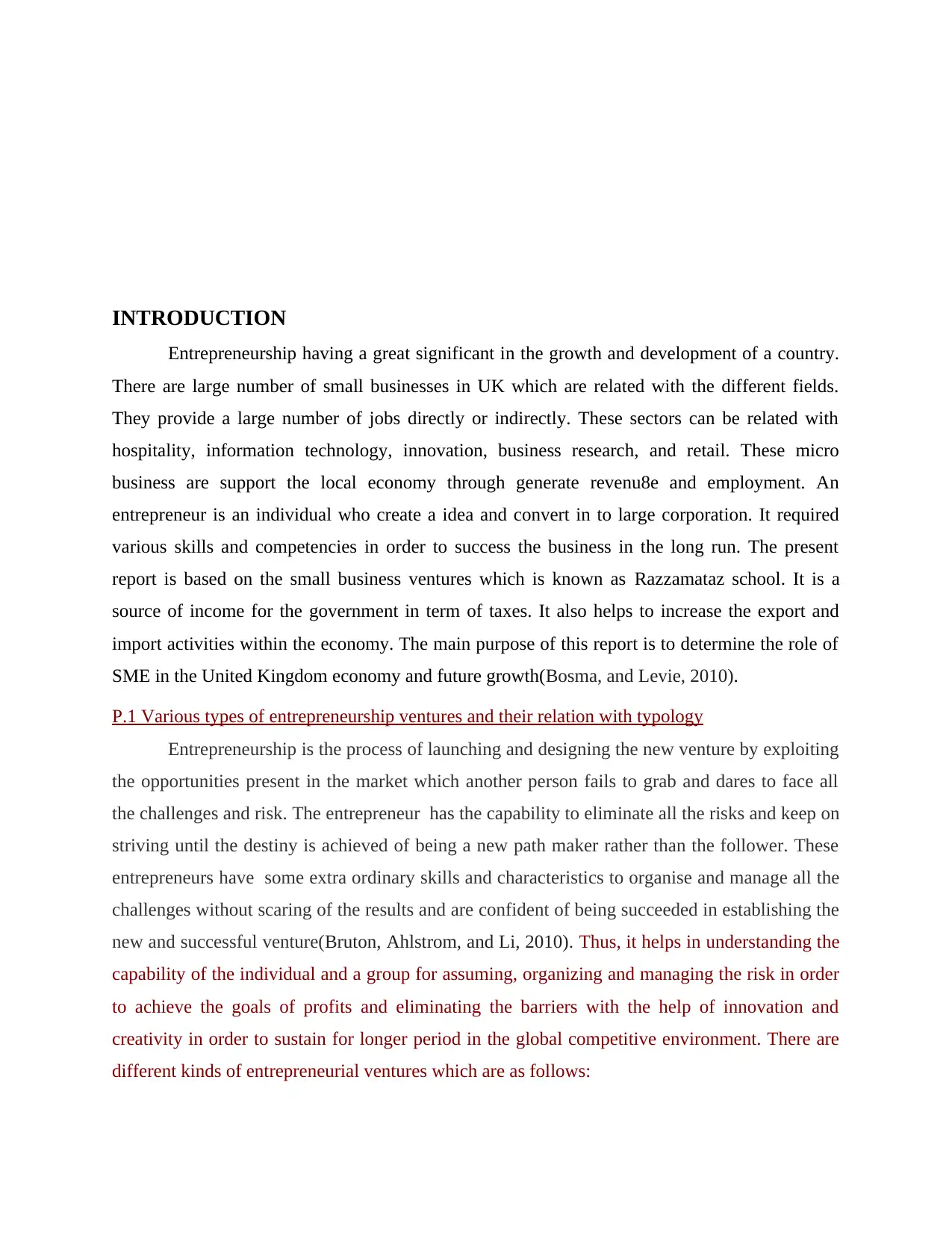
INTRODUCTION
Entrepreneurship having a great significant in the growth and development of a country.
There are large number of small businesses in UK which are related with the different fields.
They provide a large number of jobs directly or indirectly. These sectors can be related with
hospitality, information technology, innovation, business research, and retail. These micro
business are support the local economy through generate revenu8e and employment. An
entrepreneur is an individual who create a idea and convert in to large corporation. It required
various skills and competencies in order to success the business in the long run. The present
report is based on the small business ventures which is known as Razzamataz school. It is a
source of income for the government in term of taxes. It also helps to increase the export and
import activities within the economy. The main purpose of this report is to determine the role of
SME in the United Kingdom economy and future growth(Bosma, and Levie, 2010).
P.1 Various types of entrepreneurship ventures and their relation with typology
Entrepreneurship is the process of launching and designing the new venture by exploiting
the opportunities present in the market which another person fails to grab and dares to face all
the challenges and risk. The entrepreneur has the capability to eliminate all the risks and keep on
striving until the destiny is achieved of being a new path maker rather than the follower. These
entrepreneurs have some extra ordinary skills and characteristics to organise and manage all the
challenges without scaring of the results and are confident of being succeeded in establishing the
new and successful venture(Bruton, Ahlstrom, and Li, 2010). Thus, it helps in understanding the
capability of the individual and a group for assuming, organizing and managing the risk in order
to achieve the goals of profits and eliminating the barriers with the help of innovation and
creativity in order to sustain for longer period in the global competitive environment. There are
different kinds of entrepreneurial ventures which are as follows:
Entrepreneurship having a great significant in the growth and development of a country.
There are large number of small businesses in UK which are related with the different fields.
They provide a large number of jobs directly or indirectly. These sectors can be related with
hospitality, information technology, innovation, business research, and retail. These micro
business are support the local economy through generate revenu8e and employment. An
entrepreneur is an individual who create a idea and convert in to large corporation. It required
various skills and competencies in order to success the business in the long run. The present
report is based on the small business ventures which is known as Razzamataz school. It is a
source of income for the government in term of taxes. It also helps to increase the export and
import activities within the economy. The main purpose of this report is to determine the role of
SME in the United Kingdom economy and future growth(Bosma, and Levie, 2010).
P.1 Various types of entrepreneurship ventures and their relation with typology
Entrepreneurship is the process of launching and designing the new venture by exploiting
the opportunities present in the market which another person fails to grab and dares to face all
the challenges and risk. The entrepreneur has the capability to eliminate all the risks and keep on
striving until the destiny is achieved of being a new path maker rather than the follower. These
entrepreneurs have some extra ordinary skills and characteristics to organise and manage all the
challenges without scaring of the results and are confident of being succeeded in establishing the
new and successful venture(Bruton, Ahlstrom, and Li, 2010). Thus, it helps in understanding the
capability of the individual and a group for assuming, organizing and managing the risk in order
to achieve the goals of profits and eliminating the barriers with the help of innovation and
creativity in order to sustain for longer period in the global competitive environment. There are
different kinds of entrepreneurial ventures which are as follows:
⊘ This is a preview!⊘
Do you want full access?
Subscribe today to unlock all pages.

Trusted by 1+ million students worldwide
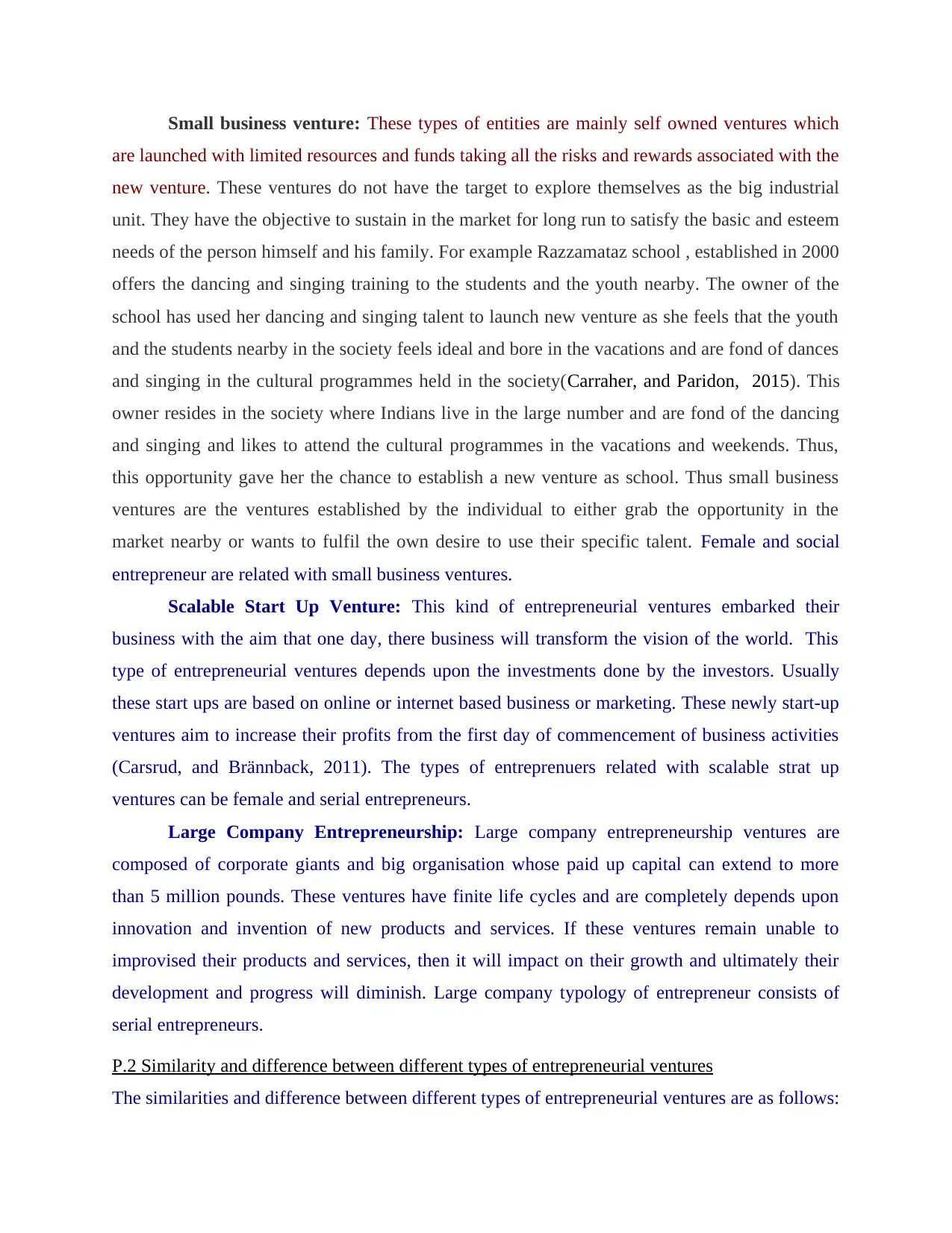
Small business venture: These types of entities are mainly self owned ventures which
are launched with limited resources and funds taking all the risks and rewards associated with the
new venture. These ventures do not have the target to explore themselves as the big industrial
unit. They have the objective to sustain in the market for long run to satisfy the basic and esteem
needs of the person himself and his family. For example Razzamataz school , established in 2000
offers the dancing and singing training to the students and the youth nearby. The owner of the
school has used her dancing and singing talent to launch new venture as she feels that the youth
and the students nearby in the society feels ideal and bore in the vacations and are fond of dances
and singing in the cultural programmes held in the society(Carraher, and Paridon, 2015). This
owner resides in the society where Indians live in the large number and are fond of the dancing
and singing and likes to attend the cultural programmes in the vacations and weekends. Thus,
this opportunity gave her the chance to establish a new venture as school. Thus small business
ventures are the ventures established by the individual to either grab the opportunity in the
market nearby or wants to fulfil the own desire to use their specific talent. Female and social
entrepreneur are related with small business ventures.
Scalable Start Up Venture: This kind of entrepreneurial ventures embarked their
business with the aim that one day, there business will transform the vision of the world. This
type of entrepreneurial ventures depends upon the investments done by the investors. Usually
these start ups are based on online or internet based business or marketing. These newly start-up
ventures aim to increase their profits from the first day of commencement of business activities
(Carsrud, and Brännback, 2011). The types of entreprenuers related with scalable strat up
ventures can be female and serial entrepreneurs.
Large Company Entrepreneurship: Large company entrepreneurship ventures are
composed of corporate giants and big organisation whose paid up capital can extend to more
than 5 million pounds. These ventures have finite life cycles and are completely depends upon
innovation and invention of new products and services. If these ventures remain unable to
improvised their products and services, then it will impact on their growth and ultimately their
development and progress will diminish. Large company typology of entrepreneur consists of
serial entrepreneurs.
P.2 Similarity and difference between different types of entrepreneurial ventures
The similarities and difference between different types of entrepreneurial ventures are as follows:
are launched with limited resources and funds taking all the risks and rewards associated with the
new venture. These ventures do not have the target to explore themselves as the big industrial
unit. They have the objective to sustain in the market for long run to satisfy the basic and esteem
needs of the person himself and his family. For example Razzamataz school , established in 2000
offers the dancing and singing training to the students and the youth nearby. The owner of the
school has used her dancing and singing talent to launch new venture as she feels that the youth
and the students nearby in the society feels ideal and bore in the vacations and are fond of dances
and singing in the cultural programmes held in the society(Carraher, and Paridon, 2015). This
owner resides in the society where Indians live in the large number and are fond of the dancing
and singing and likes to attend the cultural programmes in the vacations and weekends. Thus,
this opportunity gave her the chance to establish a new venture as school. Thus small business
ventures are the ventures established by the individual to either grab the opportunity in the
market nearby or wants to fulfil the own desire to use their specific talent. Female and social
entrepreneur are related with small business ventures.
Scalable Start Up Venture: This kind of entrepreneurial ventures embarked their
business with the aim that one day, there business will transform the vision of the world. This
type of entrepreneurial ventures depends upon the investments done by the investors. Usually
these start ups are based on online or internet based business or marketing. These newly start-up
ventures aim to increase their profits from the first day of commencement of business activities
(Carsrud, and Brännback, 2011). The types of entreprenuers related with scalable strat up
ventures can be female and serial entrepreneurs.
Large Company Entrepreneurship: Large company entrepreneurship ventures are
composed of corporate giants and big organisation whose paid up capital can extend to more
than 5 million pounds. These ventures have finite life cycles and are completely depends upon
innovation and invention of new products and services. If these ventures remain unable to
improvised their products and services, then it will impact on their growth and ultimately their
development and progress will diminish. Large company typology of entrepreneur consists of
serial entrepreneurs.
P.2 Similarity and difference between different types of entrepreneurial ventures
The similarities and difference between different types of entrepreneurial ventures are as follows:
Paraphrase This Document
Need a fresh take? Get an instant paraphrase of this document with our AI Paraphraser
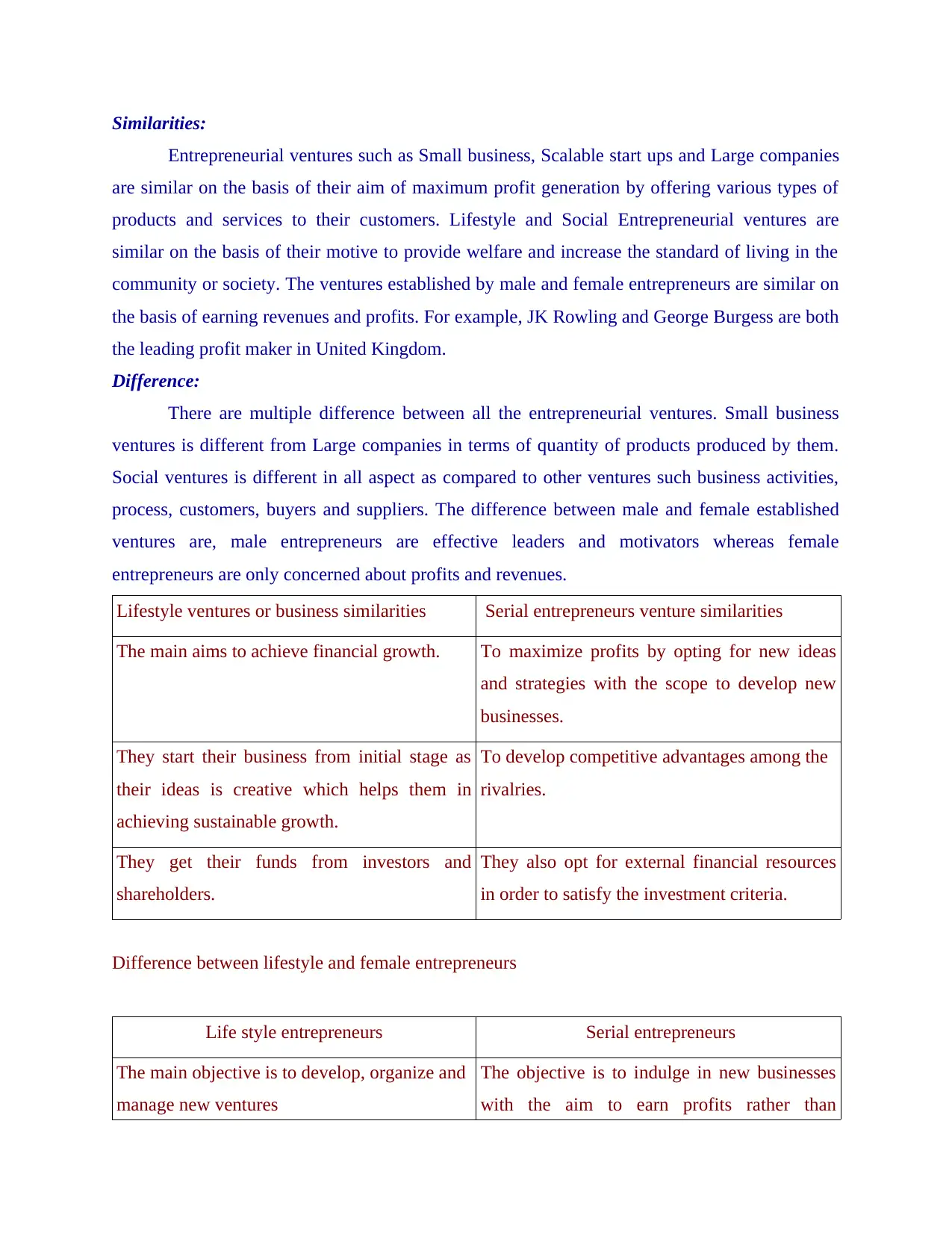
Similarities:
Entrepreneurial ventures such as Small business, Scalable start ups and Large companies
are similar on the basis of their aim of maximum profit generation by offering various types of
products and services to their customers. Lifestyle and Social Entrepreneurial ventures are
similar on the basis of their motive to provide welfare and increase the standard of living in the
community or society. The ventures established by male and female entrepreneurs are similar on
the basis of earning revenues and profits. For example, JK Rowling and George Burgess are both
the leading profit maker in United Kingdom.
Difference:
There are multiple difference between all the entrepreneurial ventures. Small business
ventures is different from Large companies in terms of quantity of products produced by them.
Social ventures is different in all aspect as compared to other ventures such business activities,
process, customers, buyers and suppliers. The difference between male and female established
ventures are, male entrepreneurs are effective leaders and motivators whereas female
entrepreneurs are only concerned about profits and revenues.
Lifestyle ventures or business similarities Serial entrepreneurs venture similarities
The main aims to achieve financial growth. To maximize profits by opting for new ideas
and strategies with the scope to develop new
businesses.
They start their business from initial stage as
their ideas is creative which helps them in
achieving sustainable growth.
To develop competitive advantages among the
rivalries.
They get their funds from investors and
shareholders.
They also opt for external financial resources
in order to satisfy the investment criteria.
Difference between lifestyle and female entrepreneurs
Life style entrepreneurs Serial entrepreneurs
The main objective is to develop, organize and
manage new ventures
The objective is to indulge in new businesses
with the aim to earn profits rather than
Entrepreneurial ventures such as Small business, Scalable start ups and Large companies
are similar on the basis of their aim of maximum profit generation by offering various types of
products and services to their customers. Lifestyle and Social Entrepreneurial ventures are
similar on the basis of their motive to provide welfare and increase the standard of living in the
community or society. The ventures established by male and female entrepreneurs are similar on
the basis of earning revenues and profits. For example, JK Rowling and George Burgess are both
the leading profit maker in United Kingdom.
Difference:
There are multiple difference between all the entrepreneurial ventures. Small business
ventures is different from Large companies in terms of quantity of products produced by them.
Social ventures is different in all aspect as compared to other ventures such business activities,
process, customers, buyers and suppliers. The difference between male and female established
ventures are, male entrepreneurs are effective leaders and motivators whereas female
entrepreneurs are only concerned about profits and revenues.
Lifestyle ventures or business similarities Serial entrepreneurs venture similarities
The main aims to achieve financial growth. To maximize profits by opting for new ideas
and strategies with the scope to develop new
businesses.
They start their business from initial stage as
their ideas is creative which helps them in
achieving sustainable growth.
To develop competitive advantages among the
rivalries.
They get their funds from investors and
shareholders.
They also opt for external financial resources
in order to satisfy the investment criteria.
Difference between lifestyle and female entrepreneurs
Life style entrepreneurs Serial entrepreneurs
The main objective is to develop, organize and
manage new ventures
The objective is to indulge in new businesses
with the aim to earn profits rather than
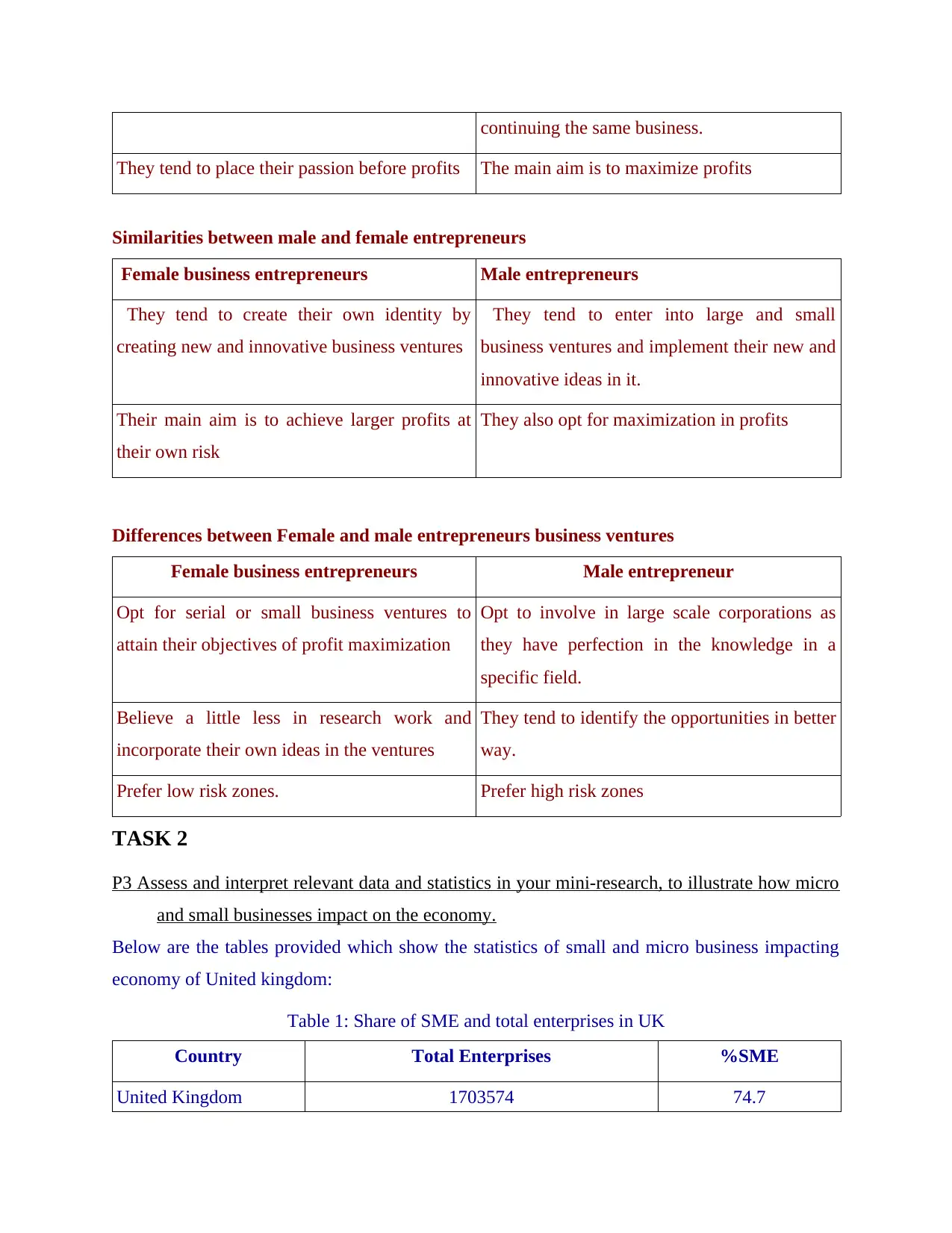
continuing the same business.
They tend to place their passion before profits The main aim is to maximize profits
Similarities between male and female entrepreneurs
Female business entrepreneurs Male entrepreneurs
They tend to create their own identity by
creating new and innovative business ventures
They tend to enter into large and small
business ventures and implement their new and
innovative ideas in it.
Their main aim is to achieve larger profits at
their own risk
They also opt for maximization in profits
Differences between Female and male entrepreneurs business ventures
Female business entrepreneurs Male entrepreneur
Opt for serial or small business ventures to
attain their objectives of profit maximization
Opt to involve in large scale corporations as
they have perfection in the knowledge in a
specific field.
Believe a little less in research work and
incorporate their own ideas in the ventures
They tend to identify the opportunities in better
way.
Prefer low risk zones. Prefer high risk zones
TASK 2
P3 Assess and interpret relevant data and statistics in your mini-research, to illustrate how micro
and small businesses impact on the economy.
Below are the tables provided which show the statistics of small and micro business impacting
economy of United kingdom:
Table 1: Share of SME and total enterprises in UK
Country Total Enterprises %SME
United Kingdom 1703574 74.7
They tend to place their passion before profits The main aim is to maximize profits
Similarities between male and female entrepreneurs
Female business entrepreneurs Male entrepreneurs
They tend to create their own identity by
creating new and innovative business ventures
They tend to enter into large and small
business ventures and implement their new and
innovative ideas in it.
Their main aim is to achieve larger profits at
their own risk
They also opt for maximization in profits
Differences between Female and male entrepreneurs business ventures
Female business entrepreneurs Male entrepreneur
Opt for serial or small business ventures to
attain their objectives of profit maximization
Opt to involve in large scale corporations as
they have perfection in the knowledge in a
specific field.
Believe a little less in research work and
incorporate their own ideas in the ventures
They tend to identify the opportunities in better
way.
Prefer low risk zones. Prefer high risk zones
TASK 2
P3 Assess and interpret relevant data and statistics in your mini-research, to illustrate how micro
and small businesses impact on the economy.
Below are the tables provided which show the statistics of small and micro business impacting
economy of United kingdom:
Table 1: Share of SME and total enterprises in UK
Country Total Enterprises %SME
United Kingdom 1703574 74.7
⊘ This is a preview!⊘
Do you want full access?
Subscribe today to unlock all pages.

Trusted by 1+ million students worldwide
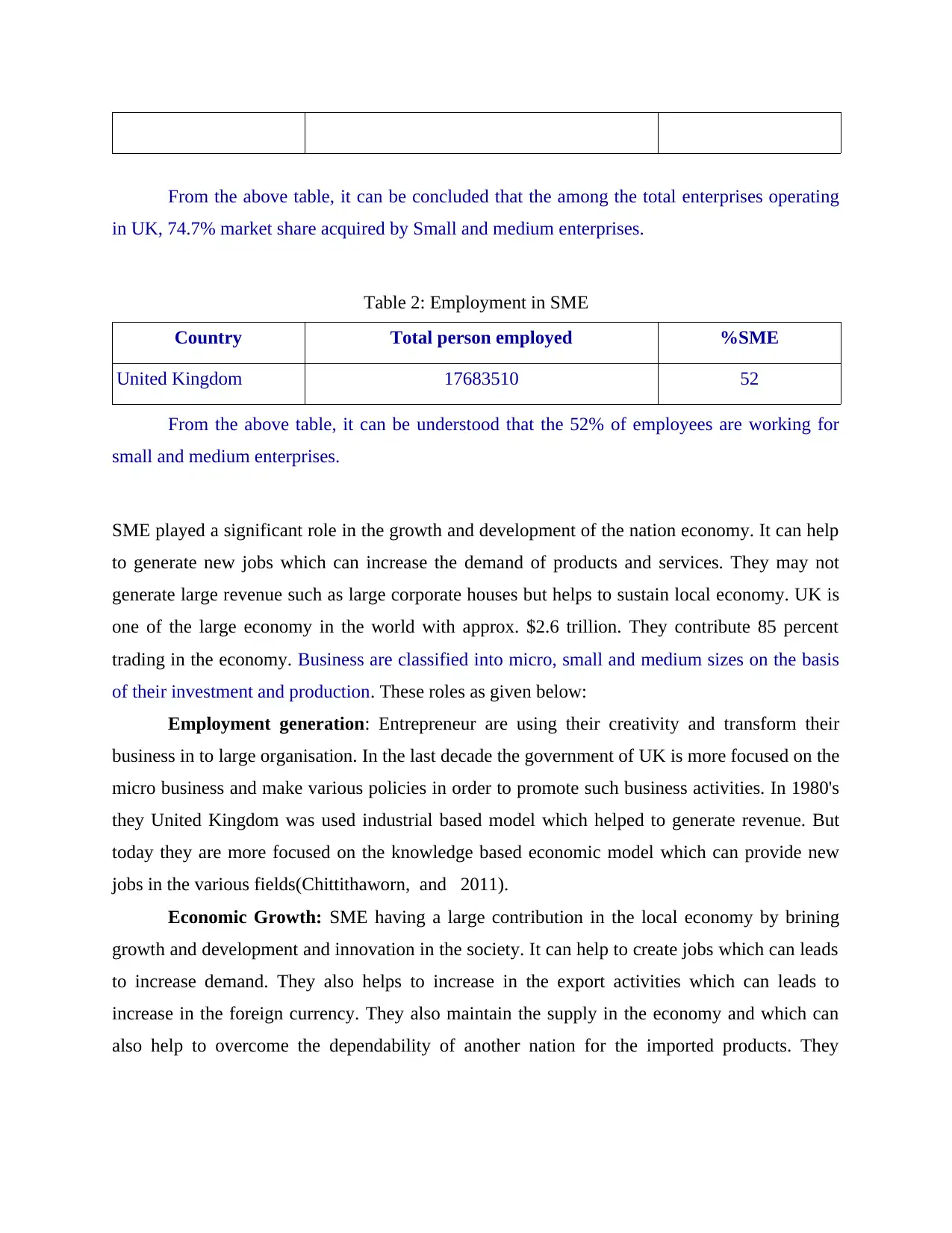
From the above table, it can be concluded that the among the total enterprises operating
in UK, 74.7% market share acquired by Small and medium enterprises.
Table 2: Employment in SME
Country Total person employed %SME
United Kingdom 17683510 52
From the above table, it can be understood that the 52% of employees are working for
small and medium enterprises.
SME played a significant role in the growth and development of the nation economy. It can help
to generate new jobs which can increase the demand of products and services. They may not
generate large revenue such as large corporate houses but helps to sustain local economy. UK is
one of the large economy in the world with approx. $2.6 trillion. They contribute 85 percent
trading in the economy. Business are classified into micro, small and medium sizes on the basis
of their investment and production. These roles as given below:
Employment generation: Entrepreneur are using their creativity and transform their
business in to large organisation. In the last decade the government of UK is more focused on the
micro business and make various policies in order to promote such business activities. In 1980's
they United Kingdom was used industrial based model which helped to generate revenue. But
today they are more focused on the knowledge based economic model which can provide new
jobs in the various fields(Chittithaworn, and 2011).
Economic Growth: SME having a large contribution in the local economy by brining
growth and development and innovation in the society. It can help to create jobs which can leads
to increase demand. They also helps to increase in the export activities which can leads to
increase in the foreign currency. They also maintain the supply in the economy and which can
also help to overcome the dependability of another nation for the imported products. They
in UK, 74.7% market share acquired by Small and medium enterprises.
Table 2: Employment in SME
Country Total person employed %SME
United Kingdom 17683510 52
From the above table, it can be understood that the 52% of employees are working for
small and medium enterprises.
SME played a significant role in the growth and development of the nation economy. It can help
to generate new jobs which can increase the demand of products and services. They may not
generate large revenue such as large corporate houses but helps to sustain local economy. UK is
one of the large economy in the world with approx. $2.6 trillion. They contribute 85 percent
trading in the economy. Business are classified into micro, small and medium sizes on the basis
of their investment and production. These roles as given below:
Employment generation: Entrepreneur are using their creativity and transform their
business in to large organisation. In the last decade the government of UK is more focused on the
micro business and make various policies in order to promote such business activities. In 1980's
they United Kingdom was used industrial based model which helped to generate revenue. But
today they are more focused on the knowledge based economic model which can provide new
jobs in the various fields(Chittithaworn, and 2011).
Economic Growth: SME having a large contribution in the local economy by brining
growth and development and innovation in the society. It can help to create jobs which can leads
to increase demand. They also helps to increase in the export activities which can leads to
increase in the foreign currency. They also maintain the supply in the economy and which can
also help to overcome the dependability of another nation for the imported products. They
Paraphrase This Document
Need a fresh take? Get an instant paraphrase of this document with our AI Paraphraser
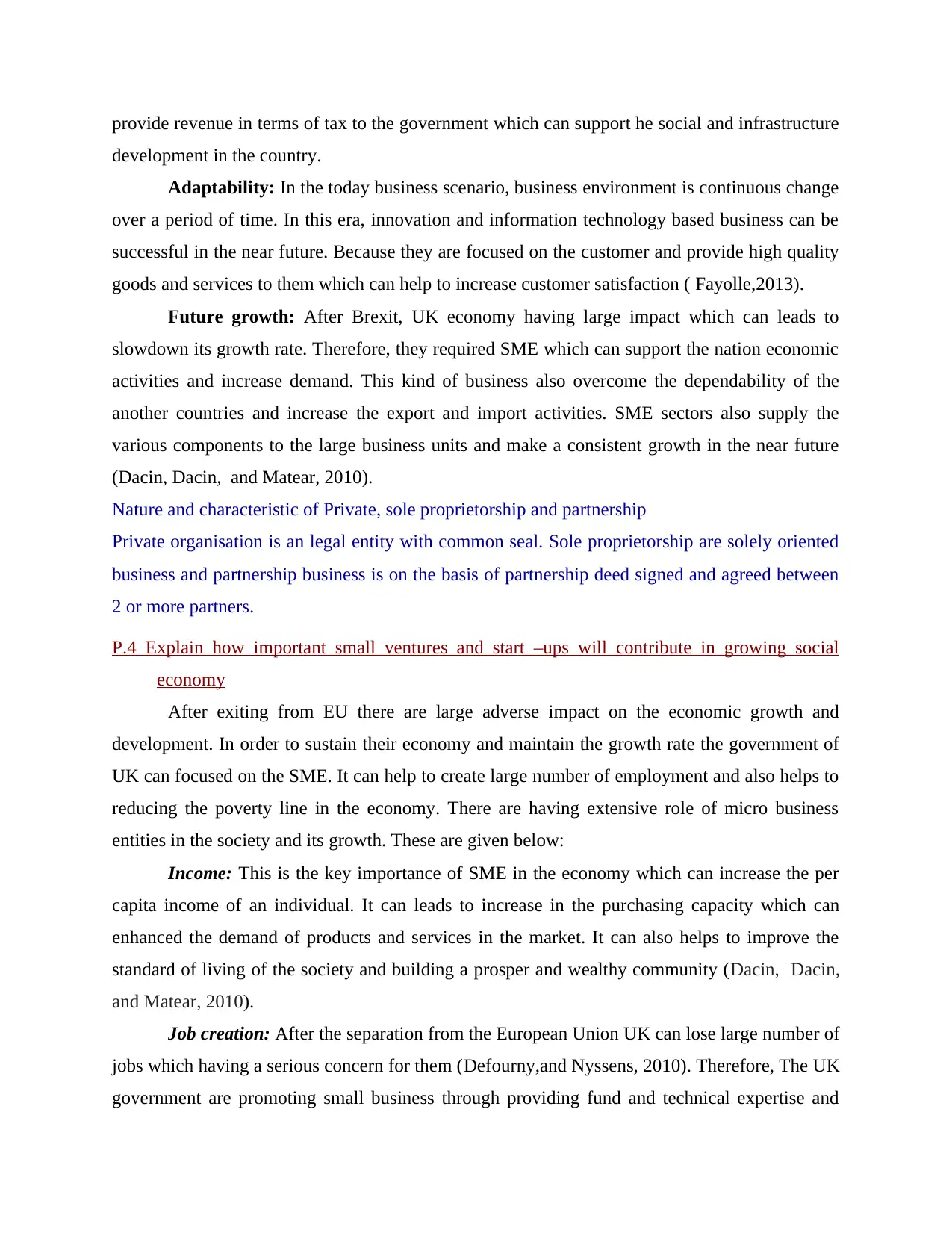
provide revenue in terms of tax to the government which can support he social and infrastructure
development in the country.
Adaptability: In the today business scenario, business environment is continuous change
over a period of time. In this era, innovation and information technology based business can be
successful in the near future. Because they are focused on the customer and provide high quality
goods and services to them which can help to increase customer satisfaction ( Fayolle,2013).
Future growth: After Brexit, UK economy having large impact which can leads to
slowdown its growth rate. Therefore, they required SME which can support the nation economic
activities and increase demand. This kind of business also overcome the dependability of the
another countries and increase the export and import activities. SME sectors also supply the
various components to the large business units and make a consistent growth in the near future
(Dacin, Dacin, and Matear, 2010).
Nature and characteristic of Private, sole proprietorship and partnership
Private organisation is an legal entity with common seal. Sole proprietorship are solely oriented
business and partnership business is on the basis of partnership deed signed and agreed between
2 or more partners.
P.4 Explain how important small ventures and start –ups will contribute in growing social
economy
After exiting from EU there are large adverse impact on the economic growth and
development. In order to sustain their economy and maintain the growth rate the government of
UK can focused on the SME. It can help to create large number of employment and also helps to
reducing the poverty line in the economy. There are having extensive role of micro business
entities in the society and its growth. These are given below:
Income: This is the key importance of SME in the economy which can increase the per
capita income of an individual. It can leads to increase in the purchasing capacity which can
enhanced the demand of products and services in the market. It can also helps to improve the
standard of living of the society and building a prosper and wealthy community (Dacin, Dacin,
and Matear, 2010).
Job creation: After the separation from the European Union UK can lose large number of
jobs which having a serious concern for them (Defourny,and Nyssens, 2010). Therefore, The UK
government are promoting small business through providing fund and technical expertise and
development in the country.
Adaptability: In the today business scenario, business environment is continuous change
over a period of time. In this era, innovation and information technology based business can be
successful in the near future. Because they are focused on the customer and provide high quality
goods and services to them which can help to increase customer satisfaction ( Fayolle,2013).
Future growth: After Brexit, UK economy having large impact which can leads to
slowdown its growth rate. Therefore, they required SME which can support the nation economic
activities and increase demand. This kind of business also overcome the dependability of the
another countries and increase the export and import activities. SME sectors also supply the
various components to the large business units and make a consistent growth in the near future
(Dacin, Dacin, and Matear, 2010).
Nature and characteristic of Private, sole proprietorship and partnership
Private organisation is an legal entity with common seal. Sole proprietorship are solely oriented
business and partnership business is on the basis of partnership deed signed and agreed between
2 or more partners.
P.4 Explain how important small ventures and start –ups will contribute in growing social
economy
After exiting from EU there are large adverse impact on the economic growth and
development. In order to sustain their economy and maintain the growth rate the government of
UK can focused on the SME. It can help to create large number of employment and also helps to
reducing the poverty line in the economy. There are having extensive role of micro business
entities in the society and its growth. These are given below:
Income: This is the key importance of SME in the economy which can increase the per
capita income of an individual. It can leads to increase in the purchasing capacity which can
enhanced the demand of products and services in the market. It can also helps to improve the
standard of living of the society and building a prosper and wealthy community (Dacin, Dacin,
and Matear, 2010).
Job creation: After the separation from the European Union UK can lose large number of
jobs which having a serious concern for them (Defourny,and Nyssens, 2010). Therefore, The UK
government are promoting small business through providing fund and technical expertise and
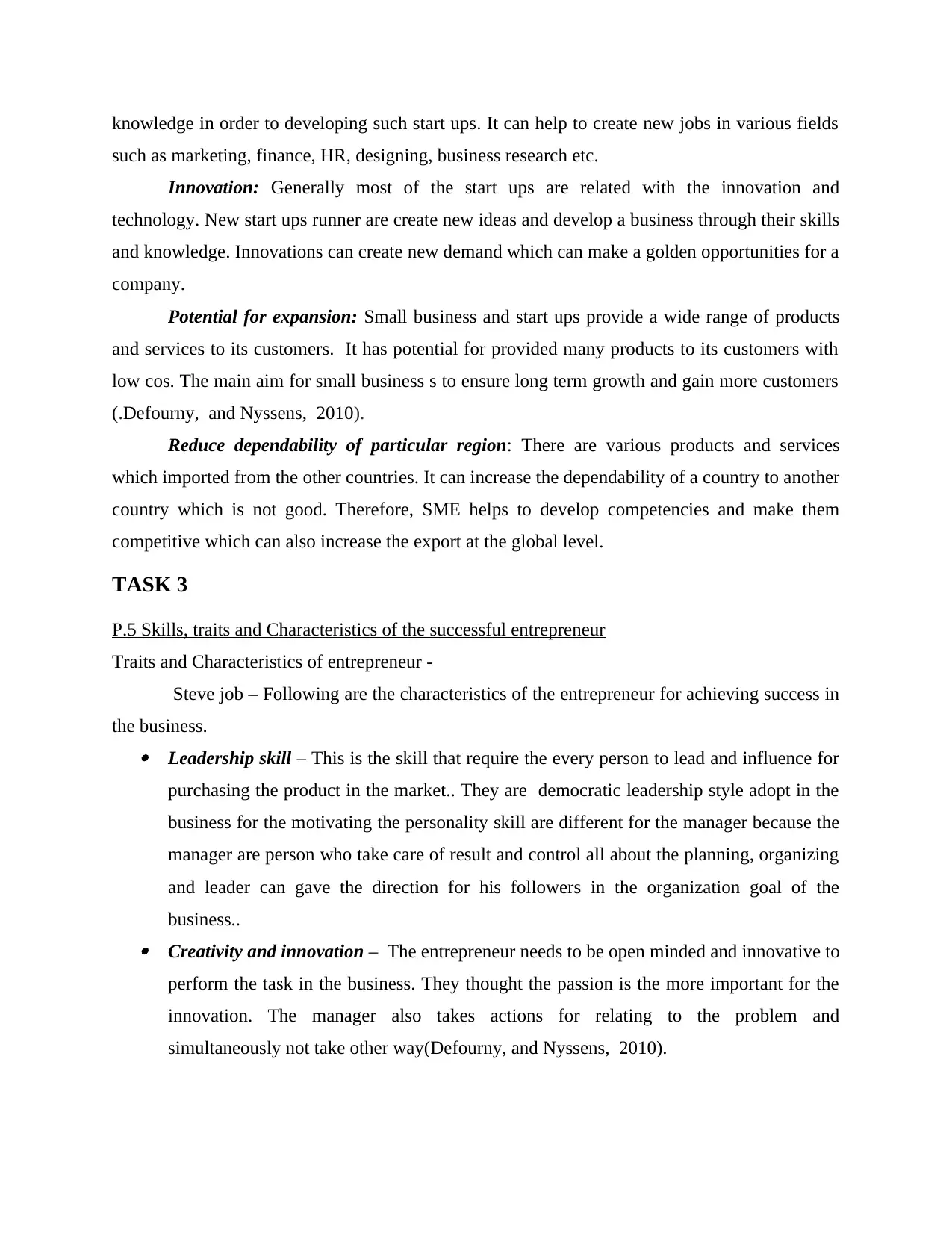
knowledge in order to developing such start ups. It can help to create new jobs in various fields
such as marketing, finance, HR, designing, business research etc.
Innovation: Generally most of the start ups are related with the innovation and
technology. New start ups runner are create new ideas and develop a business through their skills
and knowledge. Innovations can create new demand which can make a golden opportunities for a
company.
Potential for expansion: Small business and start ups provide a wide range of products
and services to its customers. It has potential for provided many products to its customers with
low cos. The main aim for small business s to ensure long term growth and gain more customers
(.Defourny, and Nyssens, 2010).
Reduce dependability of particular region: There are various products and services
which imported from the other countries. It can increase the dependability of a country to another
country which is not good. Therefore, SME helps to develop competencies and make them
competitive which can also increase the export at the global level.
TASK 3
P.5 Skills, traits and Characteristics of the successful entrepreneur
Traits and Characteristics of entrepreneur -
Steve job – Following are the characteristics of the entrepreneur for achieving success in
the business. Leadership skill – This is the skill that require the every person to lead and influence for
purchasing the product in the market.. They are democratic leadership style adopt in the
business for the motivating the personality skill are different for the manager because the
manager are person who take care of result and control all about the planning, organizing
and leader can gave the direction for his followers in the organization goal of the
business.. Creativity and innovation – The entrepreneur needs to be open minded and innovative to
perform the task in the business. They thought the passion is the more important for the
innovation. The manager also takes actions for relating to the problem and
simultaneously not take other way(Defourny, and Nyssens, 2010).
such as marketing, finance, HR, designing, business research etc.
Innovation: Generally most of the start ups are related with the innovation and
technology. New start ups runner are create new ideas and develop a business through their skills
and knowledge. Innovations can create new demand which can make a golden opportunities for a
company.
Potential for expansion: Small business and start ups provide a wide range of products
and services to its customers. It has potential for provided many products to its customers with
low cos. The main aim for small business s to ensure long term growth and gain more customers
(.Defourny, and Nyssens, 2010).
Reduce dependability of particular region: There are various products and services
which imported from the other countries. It can increase the dependability of a country to another
country which is not good. Therefore, SME helps to develop competencies and make them
competitive which can also increase the export at the global level.
TASK 3
P.5 Skills, traits and Characteristics of the successful entrepreneur
Traits and Characteristics of entrepreneur -
Steve job – Following are the characteristics of the entrepreneur for achieving success in
the business. Leadership skill – This is the skill that require the every person to lead and influence for
purchasing the product in the market.. They are democratic leadership style adopt in the
business for the motivating the personality skill are different for the manager because the
manager are person who take care of result and control all about the planning, organizing
and leader can gave the direction for his followers in the organization goal of the
business.. Creativity and innovation – The entrepreneur needs to be open minded and innovative to
perform the task in the business. They thought the passion is the more important for the
innovation. The manager also takes actions for relating to the problem and
simultaneously not take other way(Defourny, and Nyssens, 2010).
⊘ This is a preview!⊘
Do you want full access?
Subscribe today to unlock all pages.

Trusted by 1+ million students worldwide
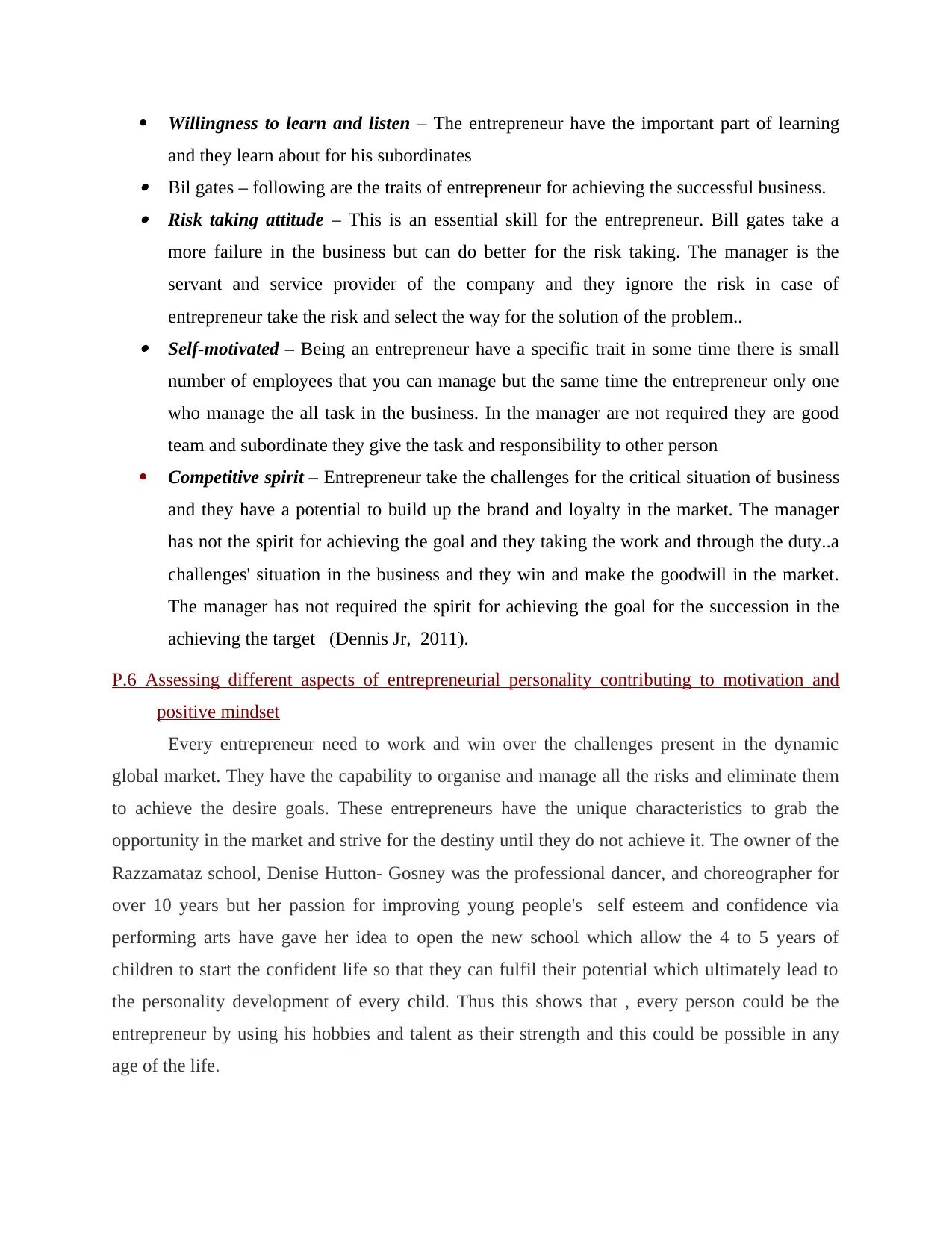
Willingness to learn and listen – The entrepreneur have the important part of learning
and they learn about for his subordinates Bil gates – following are the traits of entrepreneur for achieving the successful business. Risk taking attitude – This is an essential skill for the entrepreneur. Bill gates take a
more failure in the business but can do better for the risk taking. The manager is the
servant and service provider of the company and they ignore the risk in case of
entrepreneur take the risk and select the way for the solution of the problem.. Self-motivated – Being an entrepreneur have a specific trait in some time there is small
number of employees that you can manage but the same time the entrepreneur only one
who manage the all task in the business. In the manager are not required they are good
team and subordinate they give the task and responsibility to other person
Competitive spirit – Entrepreneur take the challenges for the critical situation of business
and they have a potential to build up the brand and loyalty in the market. The manager
has not the spirit for achieving the goal and they taking the work and through the duty..a
challenges' situation in the business and they win and make the goodwill in the market.
The manager has not required the spirit for achieving the goal for the succession in the
achieving the target (Dennis Jr, 2011).
P.6 Assessing different aspects of entrepreneurial personality contributing to motivation and
positive mindset
Every entrepreneur need to work and win over the challenges present in the dynamic
global market. They have the capability to organise and manage all the risks and eliminate them
to achieve the desire goals. These entrepreneurs have the unique characteristics to grab the
opportunity in the market and strive for the destiny until they do not achieve it. The owner of the
Razzamataz school, Denise Hutton- Gosney was the professional dancer, and choreographer for
over 10 years but her passion for improving young people's self esteem and confidence via
performing arts have gave her idea to open the new school which allow the 4 to 5 years of
children to start the confident life so that they can fulfil their potential which ultimately lead to
the personality development of every child. Thus this shows that , every person could be the
entrepreneur by using his hobbies and talent as their strength and this could be possible in any
age of the life.
and they learn about for his subordinates Bil gates – following are the traits of entrepreneur for achieving the successful business. Risk taking attitude – This is an essential skill for the entrepreneur. Bill gates take a
more failure in the business but can do better for the risk taking. The manager is the
servant and service provider of the company and they ignore the risk in case of
entrepreneur take the risk and select the way for the solution of the problem.. Self-motivated – Being an entrepreneur have a specific trait in some time there is small
number of employees that you can manage but the same time the entrepreneur only one
who manage the all task in the business. In the manager are not required they are good
team and subordinate they give the task and responsibility to other person
Competitive spirit – Entrepreneur take the challenges for the critical situation of business
and they have a potential to build up the brand and loyalty in the market. The manager
has not the spirit for achieving the goal and they taking the work and through the duty..a
challenges' situation in the business and they win and make the goodwill in the market.
The manager has not required the spirit for achieving the goal for the succession in the
achieving the target (Dennis Jr, 2011).
P.6 Assessing different aspects of entrepreneurial personality contributing to motivation and
positive mindset
Every entrepreneur need to work and win over the challenges present in the dynamic
global market. They have the capability to organise and manage all the risks and eliminate them
to achieve the desire goals. These entrepreneurs have the unique characteristics to grab the
opportunity in the market and strive for the destiny until they do not achieve it. The owner of the
Razzamataz school, Denise Hutton- Gosney was the professional dancer, and choreographer for
over 10 years but her passion for improving young people's self esteem and confidence via
performing arts have gave her idea to open the new school which allow the 4 to 5 years of
children to start the confident life so that they can fulfil their potential which ultimately lead to
the personality development of every child. Thus this shows that , every person could be the
entrepreneur by using his hobbies and talent as their strength and this could be possible in any
age of the life.
Paraphrase This Document
Need a fresh take? Get an instant paraphrase of this document with our AI Paraphraser
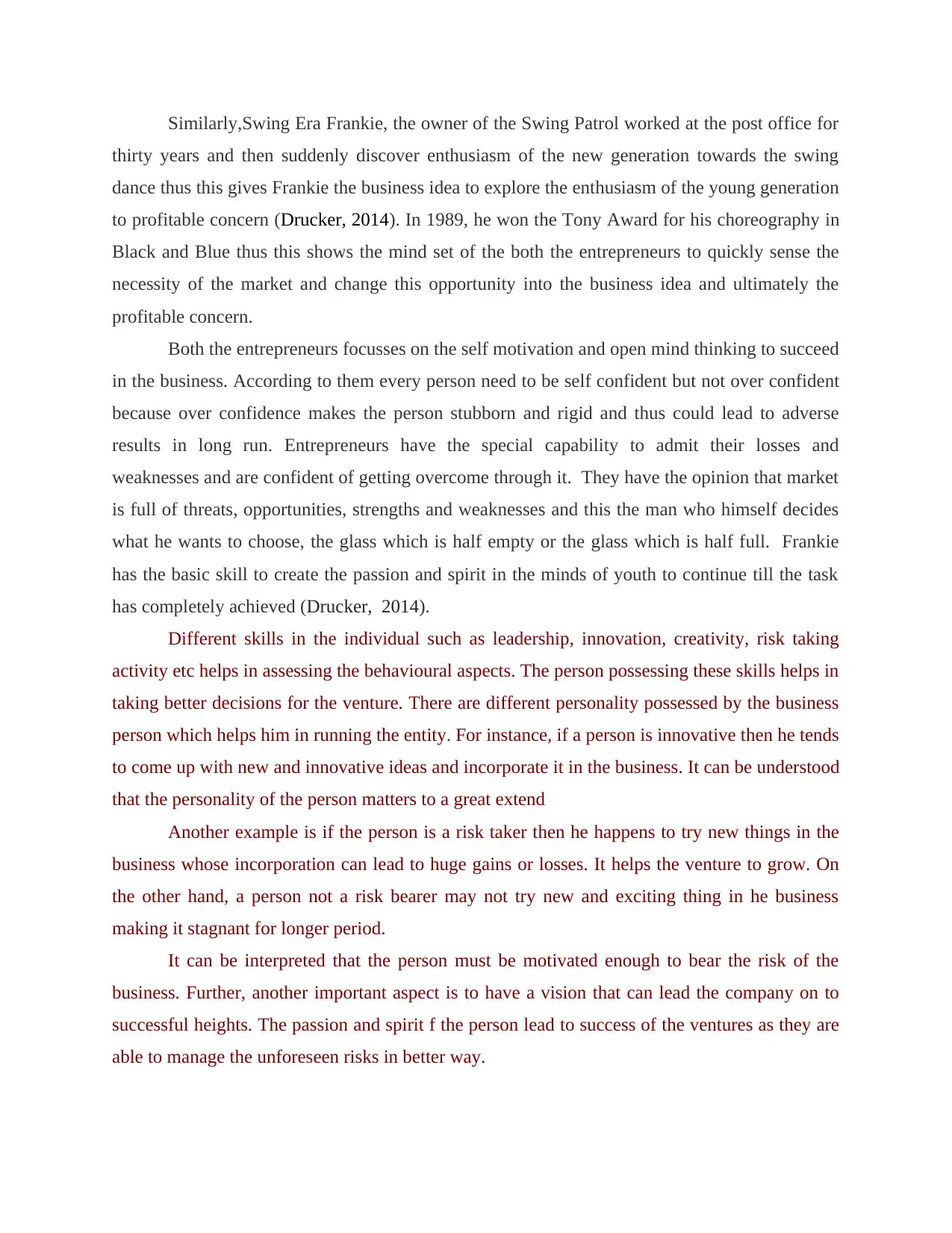
Similarly,Swing Era Frankie, the owner of the Swing Patrol worked at the post office for
thirty years and then suddenly discover enthusiasm of the new generation towards the swing
dance thus this gives Frankie the business idea to explore the enthusiasm of the young generation
to profitable concern (Drucker, 2014). In 1989, he won the Tony Award for his choreography in
Black and Blue thus this shows the mind set of the both the entrepreneurs to quickly sense the
necessity of the market and change this opportunity into the business idea and ultimately the
profitable concern.
Both the entrepreneurs focusses on the self motivation and open mind thinking to succeed
in the business. According to them every person need to be self confident but not over confident
because over confidence makes the person stubborn and rigid and thus could lead to adverse
results in long run. Entrepreneurs have the special capability to admit their losses and
weaknesses and are confident of getting overcome through it. They have the opinion that market
is full of threats, opportunities, strengths and weaknesses and this the man who himself decides
what he wants to choose, the glass which is half empty or the glass which is half full. Frankie
has the basic skill to create the passion and spirit in the minds of youth to continue till the task
has completely achieved (Drucker, 2014).
Different skills in the individual such as leadership, innovation, creativity, risk taking
activity etc helps in assessing the behavioural aspects. The person possessing these skills helps in
taking better decisions for the venture. There are different personality possessed by the business
person which helps him in running the entity. For instance, if a person is innovative then he tends
to come up with new and innovative ideas and incorporate it in the business. It can be understood
that the personality of the person matters to a great extend
Another example is if the person is a risk taker then he happens to try new things in the
business whose incorporation can lead to huge gains or losses. It helps the venture to grow. On
the other hand, a person not a risk bearer may not try new and exciting thing in he business
making it stagnant for longer period.
It can be interpreted that the person must be motivated enough to bear the risk of the
business. Further, another important aspect is to have a vision that can lead the company on to
successful heights. The passion and spirit f the person lead to success of the ventures as they are
able to manage the unforeseen risks in better way.
thirty years and then suddenly discover enthusiasm of the new generation towards the swing
dance thus this gives Frankie the business idea to explore the enthusiasm of the young generation
to profitable concern (Drucker, 2014). In 1989, he won the Tony Award for his choreography in
Black and Blue thus this shows the mind set of the both the entrepreneurs to quickly sense the
necessity of the market and change this opportunity into the business idea and ultimately the
profitable concern.
Both the entrepreneurs focusses on the self motivation and open mind thinking to succeed
in the business. According to them every person need to be self confident but not over confident
because over confidence makes the person stubborn and rigid and thus could lead to adverse
results in long run. Entrepreneurs have the special capability to admit their losses and
weaknesses and are confident of getting overcome through it. They have the opinion that market
is full of threats, opportunities, strengths and weaknesses and this the man who himself decides
what he wants to choose, the glass which is half empty or the glass which is half full. Frankie
has the basic skill to create the passion and spirit in the minds of youth to continue till the task
has completely achieved (Drucker, 2014).
Different skills in the individual such as leadership, innovation, creativity, risk taking
activity etc helps in assessing the behavioural aspects. The person possessing these skills helps in
taking better decisions for the venture. There are different personality possessed by the business
person which helps him in running the entity. For instance, if a person is innovative then he tends
to come up with new and innovative ideas and incorporate it in the business. It can be understood
that the personality of the person matters to a great extend
Another example is if the person is a risk taker then he happens to try new things in the
business whose incorporation can lead to huge gains or losses. It helps the venture to grow. On
the other hand, a person not a risk bearer may not try new and exciting thing in he business
making it stagnant for longer period.
It can be interpreted that the person must be motivated enough to bear the risk of the
business. Further, another important aspect is to have a vision that can lead the company on to
successful heights. The passion and spirit f the person lead to success of the ventures as they are
able to manage the unforeseen risks in better way.
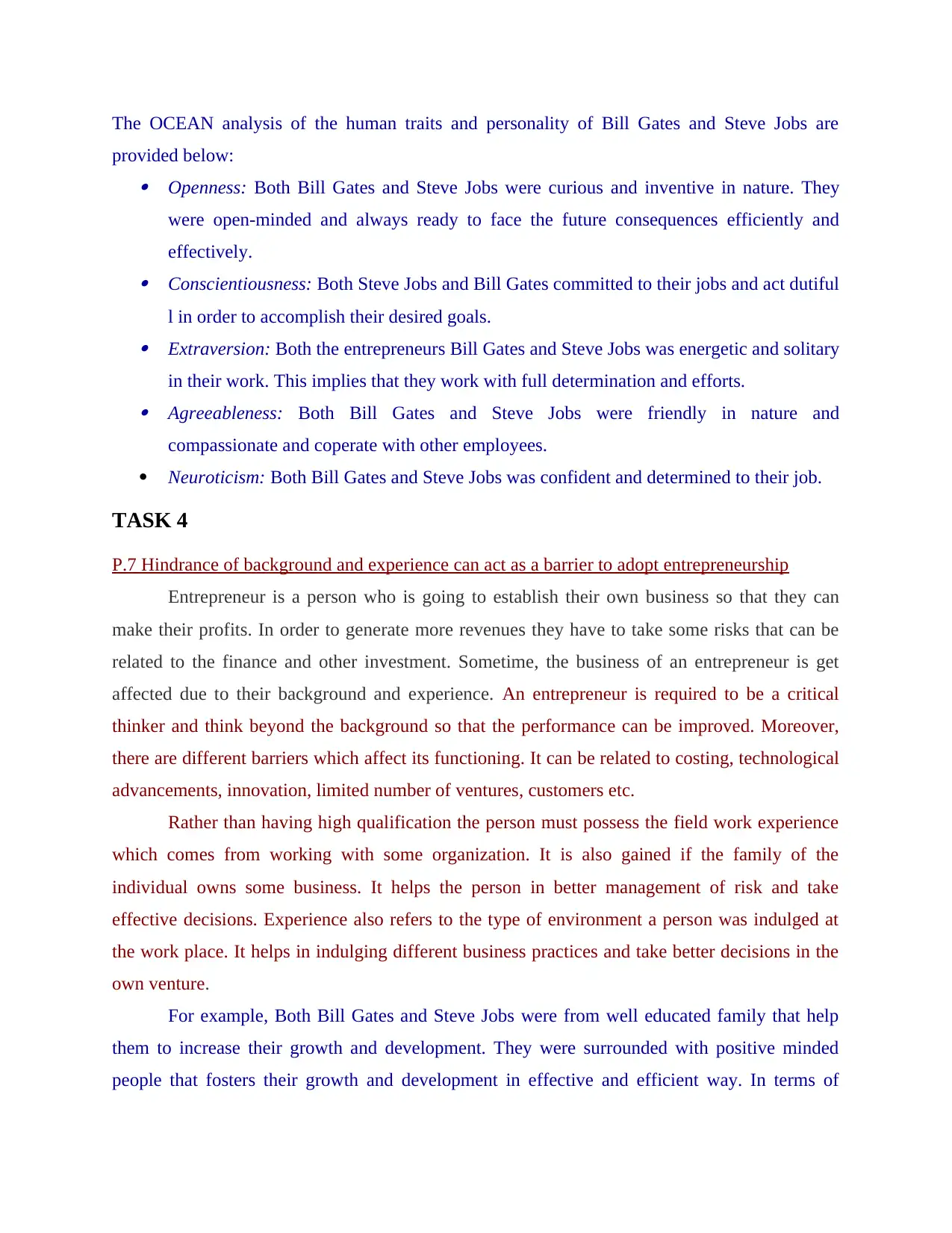
The OCEAN analysis of the human traits and personality of Bill Gates and Steve Jobs are
provided below: Openness: Both Bill Gates and Steve Jobs were curious and inventive in nature. They
were open-minded and always ready to face the future consequences efficiently and
effectively. Conscientiousness: Both Steve Jobs and Bill Gates committed to their jobs and act dutiful
l in order to accomplish their desired goals. Extraversion: Both the entrepreneurs Bill Gates and Steve Jobs was energetic and solitary
in their work. This implies that they work with full determination and efforts. Agreeableness: Both Bill Gates and Steve Jobs were friendly in nature and
compassionate and coperate with other employees.
Neuroticism: Both Bill Gates and Steve Jobs was confident and determined to their job.
TASK 4
P.7 Hindrance of background and experience can act as a barrier to adopt entrepreneurship
Entrepreneur is a person who is going to establish their own business so that they can
make their profits. In order to generate more revenues they have to take some risks that can be
related to the finance and other investment. Sometime, the business of an entrepreneur is get
affected due to their background and experience. An entrepreneur is required to be a critical
thinker and think beyond the background so that the performance can be improved. Moreover,
there are different barriers which affect its functioning. It can be related to costing, technological
advancements, innovation, limited number of ventures, customers etc.
Rather than having high qualification the person must possess the field work experience
which comes from working with some organization. It is also gained if the family of the
individual owns some business. It helps the person in better management of risk and take
effective decisions. Experience also refers to the type of environment a person was indulged at
the work place. It helps in indulging different business practices and take better decisions in the
own venture.
For example, Both Bill Gates and Steve Jobs were from well educated family that help
them to increase their growth and development. They were surrounded with positive minded
people that fosters their growth and development in effective and efficient way. In terms of
provided below: Openness: Both Bill Gates and Steve Jobs were curious and inventive in nature. They
were open-minded and always ready to face the future consequences efficiently and
effectively. Conscientiousness: Both Steve Jobs and Bill Gates committed to their jobs and act dutiful
l in order to accomplish their desired goals. Extraversion: Both the entrepreneurs Bill Gates and Steve Jobs was energetic and solitary
in their work. This implies that they work with full determination and efforts. Agreeableness: Both Bill Gates and Steve Jobs were friendly in nature and
compassionate and coperate with other employees.
Neuroticism: Both Bill Gates and Steve Jobs was confident and determined to their job.
TASK 4
P.7 Hindrance of background and experience can act as a barrier to adopt entrepreneurship
Entrepreneur is a person who is going to establish their own business so that they can
make their profits. In order to generate more revenues they have to take some risks that can be
related to the finance and other investment. Sometime, the business of an entrepreneur is get
affected due to their background and experience. An entrepreneur is required to be a critical
thinker and think beyond the background so that the performance can be improved. Moreover,
there are different barriers which affect its functioning. It can be related to costing, technological
advancements, innovation, limited number of ventures, customers etc.
Rather than having high qualification the person must possess the field work experience
which comes from working with some organization. It is also gained if the family of the
individual owns some business. It helps the person in better management of risk and take
effective decisions. Experience also refers to the type of environment a person was indulged at
the work place. It helps in indulging different business practices and take better decisions in the
own venture.
For example, Both Bill Gates and Steve Jobs were from well educated family that help
them to increase their growth and development. They were surrounded with positive minded
people that fosters their growth and development in effective and efficient way. In terms of
⊘ This is a preview!⊘
Do you want full access?
Subscribe today to unlock all pages.

Trusted by 1+ million students worldwide
1 out of 16
Related Documents
Your All-in-One AI-Powered Toolkit for Academic Success.
+13062052269
info@desklib.com
Available 24*7 on WhatsApp / Email
![[object Object]](/_next/static/media/star-bottom.7253800d.svg)
Unlock your academic potential
Copyright © 2020–2025 A2Z Services. All Rights Reserved. Developed and managed by ZUCOL.





